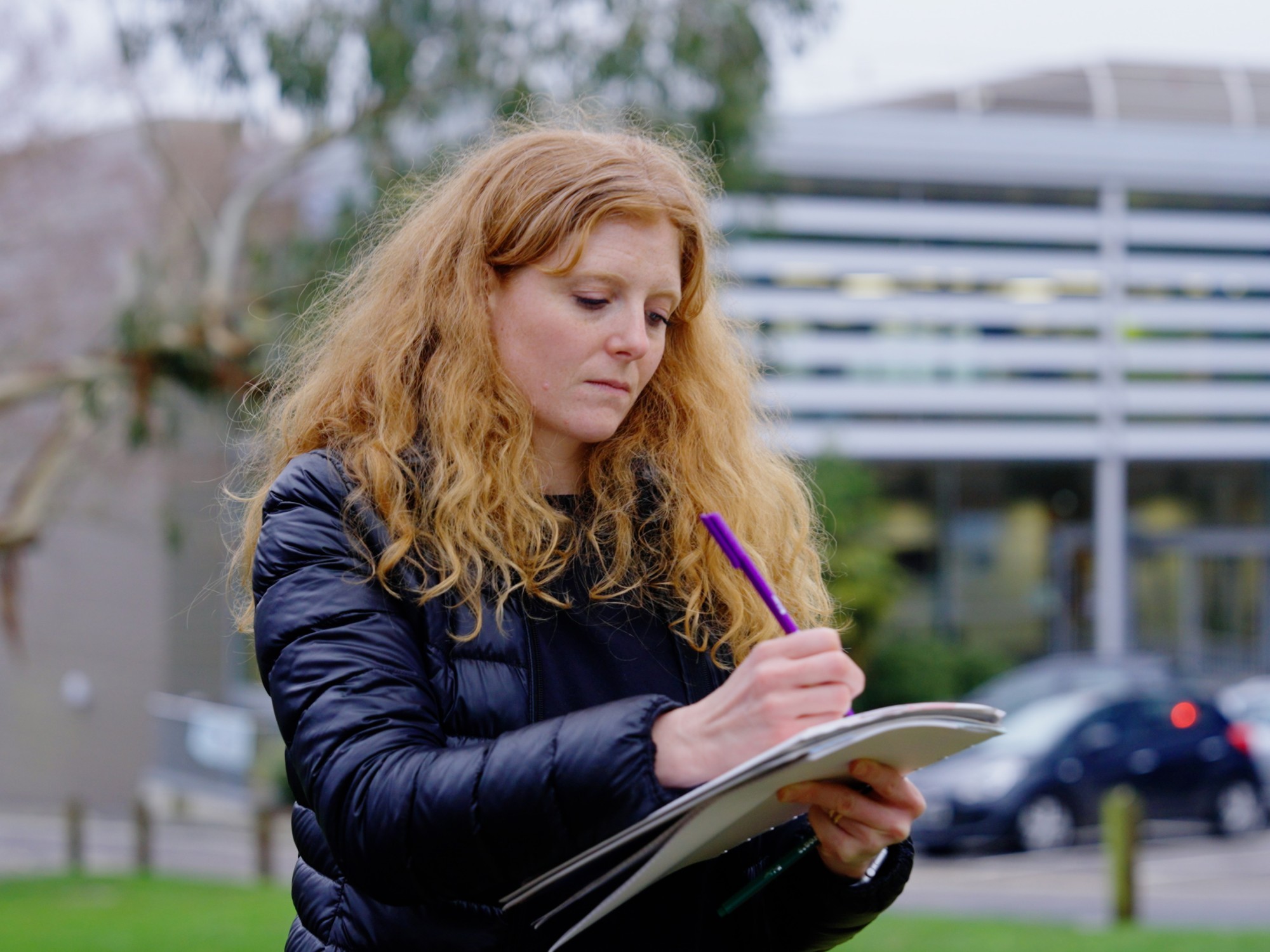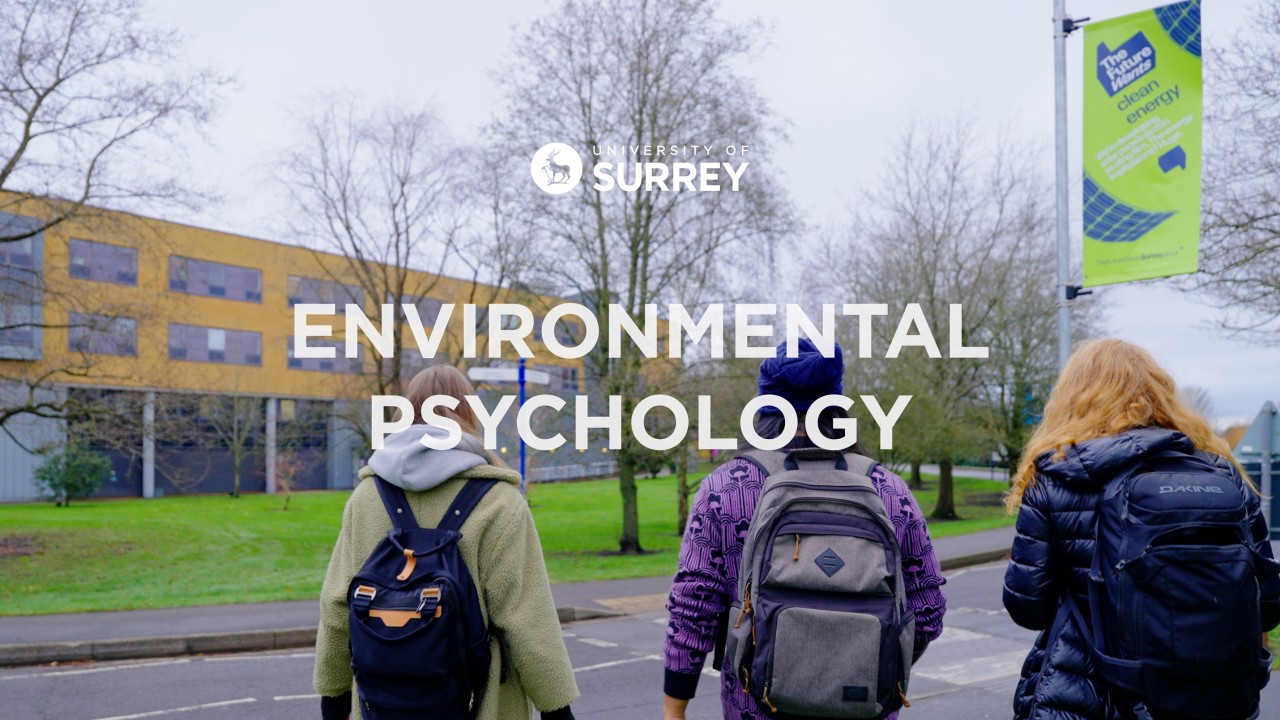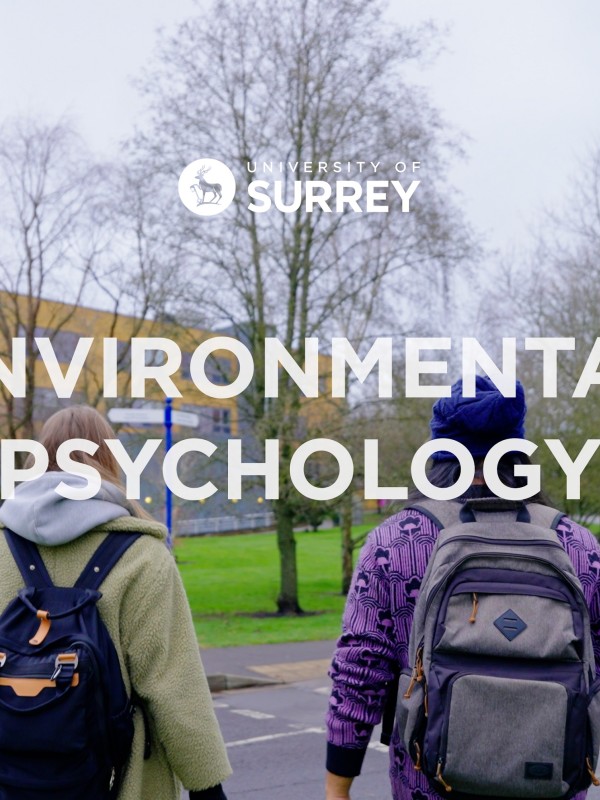
- Environmental Psychology
MSc — 2025 entry Environmental Psychology
Humanity’s relationship with the environment is the most important issue of our lifetime. Environmental psychology is at the very heart of this. Our MSc, which is unique for its focus on both sustainability and environmental design, equips you with the social science knowledge and skills needed to make a difference to our world.
Why choose
this course?
- Understand how individuals think, feel and behave in the context of their physical surroundings, to support the creation of healthy places for people and the planet.
- Make use of our state-of-the-art psychology facilities, including a virtual reality suite and two observation laboratories, and use the latest equipment to conduct experiments.
- Learn from teaching staff who are active researchers in sustainable living, wellbeing in built and urban environments, transport and mobility, benefits of nature engagement, and much more.
- Join our Environmental Psychology Research Group to take part in seminars and workshops, and benefit from our links with renowned research institutions and industries across the world.
Statistics
100%
Of our psychology masters graduates are in employment or further study (Graduate Outcomes 2024, HESA)
9th in the UK
The University of Surrey is ranked 9th in the UK for overall student satisfaction (Postgraduate Taught Experience Survey 2023)
12th in the UK
Surrey is ranked 12th in the UK in the Complete University Guide 2025
What you will study
Across the MSc programme, you will explore the relationship between people and their physical environment at every scale, from personal space in homes and offices to engagement with the natural world and awareness of environmental crises.
Within individual modules you will address issues around pro-environmental behaviour, nature and health, architectural psychology and urban environments, social change, and sustainable development, while reviewing and critically engaging with major theories and models within environmental psychology. You will also select one optional module to deepen your knowledge in an area of your choice (healthcare, global challenges or behaviour change). As a result, you will gain the knowledge and skills to support the design, management and use of environments that benefit human function and health and encourage sustainable behaviours.
We will teach you qualitative and quantitative research methods, including the use of statistics, ensuring you have a solid foundation to collect, analyse and interpret data. We offer tailored research methods training depending on your prior experience and qualifications in social science.
You’ll also complete a research dissertation, applying your theoretical and research methods skills to a topic that matters to you. Previous student projects have ranged from climate change perceptions to privacy in open-plan offices, VR experiences of urban settings, biophilic design, and the emotional and cognitive benefits of nature engagement. We’ll match your interests with the expertise of our academic staff, ensuring you get the best support.
Research groups
You’ll be invited to join our Environmental Psychology Research Group where we investigate how people interact with different types of environments, how these interactions impact people’s personal wellbeing, and how we should go about developing and managing healthy places and spaces for all. We aim to inspire your research creativity and curiosity, and support you in becoming an independent researcher within a positive academic community.
You’ll participate in discussions about key research topics, cutting-edge findings and publications, and you’ll benefit from our links with renowned research institutions and industry organisations across the world. We also have a host of external speakers who visit us and present their work, and a collection of seminars and workshops that allow you to network with like-minded individuals and take the next steps in your career.
Facilities
Our exceptional facilities will give you access to the latest equipment, including a virtual reality suite to simulate real-life scenarios and two observation labs. You’ll also have access to an extensive library of psychometric and clinical tests, 20 bookable project rooms, a breakout space, equipment lockers and a computer lab.
The structure of our programmes follows clear educational aims that are tailored to each programme. These are all outlined in the programme specifications which include further details such as the learning outcomes:
Modules
Modules listed are indicative, reflecting the information available at the time of publication. Modules are subject to teaching availability, student demand and/or class size caps.
The University operates a credit framework for all taught programmes based on a 15-credit tariff, meaning all modules are comprised of multiples of 15 credits, up to a maximum of 120 credits.
Course options
Year 1
Semester 1
Compulsory
This module provides students with an advanced understanding of current theories and conceptualisations of social change and influence, including facilitators of and constraints on change. It offers a critical engagement with these theories and an application of them to a range of social issues that are a focus of the United Nations Sustainability Development Goals. The applied aspect includes a consideration of the value of psychological conceptualisations of social change and influence for policy making, public health, and equality. This core module will allow students to build knowledge and skills that will prepare students for the rest of the programme and the optional modules
View full module detailsThis level 7 module introduces students to the principles and practices of qualitative research. It provides students with the requisite knowledge and skills to undertake, critically evaluate, and write up a small qualitative research project. Students will be introduced to a range of methods of qualitative data collection and analytic procedures and gain insight into the application of qualitative methods through practical group work. Students will be encouraged to participate actively and think critically about the principles, methods and procedures that we will discuss. In terms of the students’ learning journey, the module will equip them to undertake a qualitative project for their dissertation should they choose to do so. The module is designed to introduce students who have little or no experience of qualitative research to the principles and practices of this approach. It also meets the needs of those who already have some experience in this area, by enabling these students to build on, refine, and extend their existing knowledge through the provision of advanced material on Surrey Learn in the form of captured content relating to additional methods of analysing qualitative data. These students will also be encouraged to extend their practical knowledge and experience by selecting an analytic procedure that they have not previously used to analyse the data for their group project. Through conducting a small group project students will be given the opportunity to gain experience in conducting qualitative research and in applying the principles and practices covered in the lectures. The module provides students with an opportunity to learn about the interpersonal skills required to conduct a good research interview and those needed to successfully conduct and manage a group project. Students are also encouraged to develop their personal reflective skills to enhance their understanding of how their own cultural background, social identity, gender, previous experiences, and prior knowledge can shape data collection and analysis, as well as individual sense-making.
View full module detailsThe module introduces students to some of the key questions which currently guide research and practice in environmental psychology. The module addresses issues around architectural psychology as well as global and local environmental problems facing our world today. It provides an insight into the psychology of environment-behaviour issues focusing on built (residential, work and public) and natural environments. The main focus of the module will be to provide an insight into the research and theory development to date and to familiarise students with the practical and multidisciplinary nature of the field. By the end of the module students should have an advanced understanding of the nature and scope of some of the principal theoretical and methodological developments in this area of research and an understanding of the application of psychological theory and concepts to an important area of everyday life.
View full module detailsOptional
This module equips students with the skills to design and undertake academic research in psychology, in preparation for developing their own dissertations. The module will cover key aspects of research design, including literature review, forming hypotheses, ethical conduct, and study design and methods, both quantitative and qualitative. Students will propose a study design in a group presentation; implement the study via small-scale data collection and analysis; and present and discuss the findings in an individual research report.
View full module detailsThis module will provide students with knowledge, skills, and practical experience of advanced research methods and design. It emphasises a critical and creative approach to evaluating research methods and design and applying them to scientific questions. It will support the development of novel, theoretically significant, rigorous, and impactful research proposals.
View full module detailsSemester 2
Compulsory
This course is a lab-based/practical course intended to get students to use the freely available Jamovi software for data analysis and to understand what they are doing when they use it.
View full module detailsThis module introduces students to psychological perspectives on understanding and addressing environmental and sustainability challenges. The module provides an overview of theoretical formulations and research evidence related to 1) people’s understandings and perceptions of environmental risks, 2) environmental and materialistic values, 3) environment and wellbeing, and 4) pro-environmental behaviour change. The module is based on the research-practitioner model and aims to enable students to develop an understanding of how psychological research can help tackle environmental challenges by drawing on empirical research evidence. By the end of the module students should have an advanced understanding of some of the principles and theoretical and methodological developments in the area, and understand the value of this knowledge for helping to tackle environmental challenges.
View full module detailsThis module builds on the knowledge gained in semester 1 modules, such as PSYM137, by addressing key topics and concepts in Environmental Psychology research. This time the concepts are grounded within architecture and planning, thus practical implications and the application of the research will also be discussed. This will extend your practical understanding of how people's cognitions, emotions, and planned behaviours influence how they interact with built environments and simultaneously why these responses may occur due to different architectural designs and urban planning systems.Students will have the opportunity to incorporate information learnt from semester 1 and 2 methodology modules to help evaluate built environments. Overall, through providing students with conceptual underpinnings that inform their research and practice approaches, the module enables students to apply their knowledge to assess and design better places for people and the planet, thereby enhancing their employability.Each week a different topic or concept is discussed (e.g. affordances, privacy) or specific behaviours in certain conditions or environments are examined (e.g. crime and the environment). Indeed theoretical concepts and behaviours are explored across a range of environments including residential environments, work environments, hospitals, and public spaces, with research and examples from across the globe to enhance cultural capabilities. In class activities and discussions, along with the workshop offer a practical component to examining the issues presented in class lectures and suggested reading.
View full module detailsOptional
This dual-level module seeks to both explore theories and models of people's behaviour, and to illustrate these via application to real-world, contemporary issues. Students will be introduced to a range of psychological approaches that can be used to understand and influence behaviour (e.g., motivational approaches, nudging), and to a range of applied behavioural contexts including health (e.g., how can we help people be more active?) and environmental (e.g., how can we help people consume less energy?). Each lecture serves to introduce both one psychological theory or concept, and a specific real-world behavioural challenge, to which that theory (and others) may be applied. Lectures are supplemented by seminars and workshops. Seminars involve unassessed group presentations and critical discussions of research papers relating to the application of psychological strategies to contemporary behaviour change challenges. Workshops centre on group-based, problem-based learning, with students addressing a real-world behaviour change problem.
View full module detailsOverview This module provides psychology students with a grounding in how the theories and methods of the discipline are being used to address real-world challenges. In doing so, it allows students an overview of some of the research taking place within Surrey's School of Psychology, and introduces some of the academics who work here. The module uses the UN Sustainable Development Goals (SDGs - https://sdgs.un.org/goals) as an organising structure. Each of the core weeks is focused around the work of a researcher or team, and is framed in terms of how this research addresses one of the SDGs. (For example, work from the Environmental Psychology Research Group might presented as an example of how psychology addresses the "Sustainable Cities and Communities" SDG).
View full module detailsThis module covers psychological factors that influence the patient's passage through the health care system from symptom perception to help seeking to the consultation with a focus on specific aspects of health care such as surgery and vaccinations. This module has been designed in accordance with requirements (stage 1) of the British Psychological Society's Division of Health Psychology accreditation criteria. This module addresses the following curriculum areas for a British Psychological Society accredited Health Psychology Masters degree: contexts and perspectives in health psychology, client groups and other stakeholders, health-related behaviour and cognitions, interventions, measurement issues and healthcare and professional settings. This module will help students to better understand how health psychology theory can help us understand the patient experience of healthcare.
View full module detailsSemester 1 & 2
Core
It is a requirement of the University that taught postgraduate programmes include a dissertation and/or major project module. For this module students will conduct their own piece of empirical research in an area relevant to their Masters course, under supervision of a member of academic staff. For the assessment students will subject either a qualitative or mixed-method research report of 10,000 words or a quantitative research report of 8,000 words (maximum).Overall student workload: 600 hoursThis includes 12 hours of tutor supervision. These hours will include development of theoretical framework, aims and hypotheses, recruiting samples, fieldwork and liaison with key personnel as appropriate, data recording and analysis, interpretation and writing up. Specific times for these subsections cannot be given as they vary from project to project.
View full module detailsOptional modules for Year 1 (full-time) - FHEQ Level 7
In Semester 1, students can choose a research methods training module that suits their level of foundational knowledge. They should select either Advanced Research Methods and Design (PSYM147), recommended for those with a first degree in Psychology or a related social science; or Academic Research Training (PSYM130), recommended for those without. In Semester 2, students should choose one of the optional modules from the three available options.
Year 1
Semester 1
Compulsory
The module introduces students to some of the key questions which currently guide research and practice in environmental psychology. The module addresses issues around architectural psychology as well as global and local environmental problems facing our world today. It provides an insight into the psychology of environment-behaviour issues focusing on built (residential, work and public) and natural environments. The main focus of the module will be to provide an insight into the research and theory development to date and to familiarise students with the practical and multidisciplinary nature of the field. By the end of the module students should have an advanced understanding of the nature and scope of some of the principal theoretical and methodological developments in this area of research and an understanding of the application of psychological theory and concepts to an important area of everyday life.
View full module detailsOptional
This module equips students with the skills to design and undertake academic research in psychology, in preparation for developing their own dissertations. The module will cover key aspects of research design, including literature review, forming hypotheses, ethical conduct, and study design and methods, both quantitative and qualitative. Students will propose a study design in a group presentation; implement the study via small-scale data collection and analysis; and present and discuss the findings in an individual research report.
View full module detailsThis module will provide students with knowledge, skills, and practical experience of advanced research methods and design. It emphasises a critical and creative approach to evaluating research methods and design and applying them to scientific questions. It will support the development of novel, theoretically significant, rigorous, and impactful research proposals.
View full module detailsSemester 2
Compulsory
This course is a lab-based/practical course intended to get students to use the freely available Jamovi software for data analysis and to understand what they are doing when they use it.
View full module detailsThis module builds on the knowledge gained in semester 1 modules, such as PSYM137, by addressing key topics and concepts in Environmental Psychology research. This time the concepts are grounded within architecture and planning, thus practical implications and the application of the research will also be discussed. This will extend your practical understanding of how people's cognitions, emotions, and planned behaviours influence how they interact with built environments and simultaneously why these responses may occur due to different architectural designs and urban planning systems.Students will have the opportunity to incorporate information learnt from semester 1 and 2 methodology modules to help evaluate built environments. Overall, through providing students with conceptual underpinnings that inform their research and practice approaches, the module enables students to apply their knowledge to assess and design better places for people and the planet, thereby enhancing their employability.Each week a different topic or concept is discussed (e.g. affordances, privacy) or specific behaviours in certain conditions or environments are examined (e.g. crime and the environment). Indeed theoretical concepts and behaviours are explored across a range of environments including residential environments, work environments, hospitals, and public spaces, with research and examples from across the globe to enhance cultural capabilities. In class activities and discussions, along with the workshop offer a practical component to examining the issues presented in class lectures and suggested reading.
View full module detailsOptional modules for Year 1 (part-time) - FHEQ Level 7
In Semester 1, students can choose a research methods training module that suits their level of foundational knowledge. They should select either Advanced Research Methods and Design (PSYM147), recommended for those with a first degree in Psychology or a related social science; or Academic Research Training (PSYM130), recommended for those without.
Year 2
Semester 1
Compulsory
This module provides students with an advanced understanding of current theories and conceptualisations of social change and influence, including facilitators of and constraints on change. It offers a critical engagement with these theories and an application of them to a range of social issues that are a focus of the United Nations Sustainability Development Goals. The applied aspect includes a consideration of the value of psychological conceptualisations of social change and influence for policy making, public health, and equality. This core module will allow students to build knowledge and skills that will prepare students for the rest of the programme and the optional modules
View full module detailsThis level 7 module introduces students to the principles and practices of qualitative research. It provides students with the requisite knowledge and skills to undertake, critically evaluate, and write up a small qualitative research project. Students will be introduced to a range of methods of qualitative data collection and analytic procedures and gain insight into the application of qualitative methods through practical group work. Students will be encouraged to participate actively and think critically about the principles, methods and procedures that we will discuss. In terms of the students’ learning journey, the module will equip them to undertake a qualitative project for their dissertation should they choose to do so. The module is designed to introduce students who have little or no experience of qualitative research to the principles and practices of this approach. It also meets the needs of those who already have some experience in this area, by enabling these students to build on, refine, and extend their existing knowledge through the provision of advanced material on Surrey Learn in the form of captured content relating to additional methods of analysing qualitative data. These students will also be encouraged to extend their practical knowledge and experience by selecting an analytic procedure that they have not previously used to analyse the data for their group project. Through conducting a small group project students will be given the opportunity to gain experience in conducting qualitative research and in applying the principles and practices covered in the lectures. The module provides students with an opportunity to learn about the interpersonal skills required to conduct a good research interview and those needed to successfully conduct and manage a group project. Students are also encouraged to develop their personal reflective skills to enhance their understanding of how their own cultural background, social identity, gender, previous experiences, and prior knowledge can shape data collection and analysis, as well as individual sense-making.
View full module detailsSemester 2
Compulsory
This module introduces students to psychological perspectives on understanding and addressing environmental and sustainability challenges. The module provides an overview of theoretical formulations and research evidence related to 1) people’s understandings and perceptions of environmental risks, 2) environmental and materialistic values, 3) environment and wellbeing, and 4) pro-environmental behaviour change. The module is based on the research-practitioner model and aims to enable students to develop an understanding of how psychological research can help tackle environmental challenges by drawing on empirical research evidence. By the end of the module students should have an advanced understanding of some of the principles and theoretical and methodological developments in the area, and understand the value of this knowledge for helping to tackle environmental challenges.
View full module detailsOptional
This dual-level module seeks to both explore theories and models of people's behaviour, and to illustrate these via application to real-world, contemporary issues. Students will be introduced to a range of psychological approaches that can be used to understand and influence behaviour (e.g., motivational approaches, nudging), and to a range of applied behavioural contexts including health (e.g., how can we help people be more active?) and environmental (e.g., how can we help people consume less energy?). Each lecture serves to introduce both one psychological theory or concept, and a specific real-world behavioural challenge, to which that theory (and others) may be applied. Lectures are supplemented by seminars and workshops. Seminars involve unassessed group presentations and critical discussions of research papers relating to the application of psychological strategies to contemporary behaviour change challenges. Workshops centre on group-based, problem-based learning, with students addressing a real-world behaviour change problem.
View full module detailsOverview This module provides psychology students with a grounding in how the theories and methods of the discipline are being used to address real-world challenges. In doing so, it allows students an overview of some of the research taking place within Surrey's School of Psychology, and introduces some of the academics who work here. The module uses the UN Sustainable Development Goals (SDGs - https://sdgs.un.org/goals) as an organising structure. Each of the core weeks is focused around the work of a researcher or team, and is framed in terms of how this research addresses one of the SDGs. (For example, work from the Environmental Psychology Research Group might presented as an example of how psychology addresses the "Sustainable Cities and Communities" SDG).
View full module detailsThis module covers psychological factors that influence the patient's passage through the health care system from symptom perception to help seeking to the consultation with a focus on specific aspects of health care such as surgery and vaccinations. This module has been designed in accordance with requirements (stage 1) of the British Psychological Society's Division of Health Psychology accreditation criteria. This module addresses the following curriculum areas for a British Psychological Society accredited Health Psychology Masters degree: contexts and perspectives in health psychology, client groups and other stakeholders, health-related behaviour and cognitions, interventions, measurement issues and healthcare and professional settings. This module will help students to better understand how health psychology theory can help us understand the patient experience of healthcare.
View full module detailsSemester 1 & 2
Core
It is a requirement of the University that taught postgraduate programmes include a dissertation and/or major project module. For this module students will conduct their own piece of empirical research in an area relevant to their Masters course, under supervision of a member of academic staff. For the assessment students will subject either a qualitative or mixed-method research report of 10,000 words or a quantitative research report of 8,000 words (maximum).Overall student workload: 600 hoursThis includes 12 hours of tutor supervision. These hours will include development of theoretical framework, aims and hypotheses, recruiting samples, fieldwork and liaison with key personnel as appropriate, data recording and analysis, interpretation and writing up. Specific times for these subsections cannot be given as they vary from project to project.
View full module detailsOptional modules for Year 2 (part-time) - FHEQ Level 7
In Semester 2, students should choose one of the optional modules from the three available options.
Teaching and learning
You’ll be taught by staff who are active researchers, ensuring everything you learn is up-to-date and relevant to employers. These include:
- Professor Birgitta Gatersleben, an expert in sustainable living
- Dr Eleanor Ratcliffe, an expert in restorative environments and place
- Dr Melissa Marselle, an expert in biodiversity and wellbeing
- Dr Sarah Payne, an expert in soundscapes and healthcare environments.
Learning methods
Your teaching will be delivered through a combination of:
- Case studies
- Group work (e.g. discussion groups)
- Lectures
- Online learning
- Seminars
- Workshops.
Outside of these, you’ll be expected to carry out independent study, including coursework, place analyses and reading.
Assessment
We use a variety of methods to assess you, including coursework, essays, examinations and presentations.
Check individual module information to see full details at a module level.
General course information
Contact hours
Contact hours can vary across our modules. Full details of the contact hours for each module are available from the University of Surrey's module catalogue. See the modules section for more information.
Timetable
Course timetables are normally available one month before the start of the semester.
New students will receive their personalised timetable in Welcome Week, and in subsequent semesters, two weeks prior to the start of semester.
Please note that while we make every effort to ensure that timetables are as student-friendly as possible, scheduled teaching can take place on any day of the week (Monday – Friday). Wednesday afternoons are normally reserved for sports and cultural activities. Part-time classes are normally scheduled on one or two days per week, details of which can be obtained from Academic Administration.
Location
This course is based at Stag Hill campus. Stag Hill is the University's main campus and where the majority of our courses are taught.
We offer careers information, advice and guidance to all students whilst studying with us, which is extended to our alumni for three years after leaving the University.
Our MSc Environmental Psychology graduates go on to work in, for example:
Governmental departments and agencies
- Forest Research
- Environment Agency
- San Francisco Planning Department
- Natural Resources Institute Finland.
Third sector and NGOs
Consultancy
Architecture and design, engineering, and planning
Academia
- PhD research here at Surrey
- University of Plymouth
- University of Auckland
- University of Manchester
- City University of New York.
The broad and transferrable skills that you’ll develop as a social scientist are also highly applicable to other fields. Environmental psychology is increasingly relevant in sustainability, social responsibility, and wellbeing-focused roles across the private sector; in marketing and communications; and in technology and media.
We will discuss your professional development goals to help you apply your MSc learning to your career.


George Murrell
Student - Environmental Psychology MSc
"I have already secured a job as a social scientist at Forest Research. It’s a great role where I can apply lots of what I've learnt from my studies to real research."


Maria Tam
Graduate - Environmental Psychology MSc
"The things I learnt at Surrey form the backbone of what I do now. The course is all about environmental psychology, and now I’m an environmental psychologist at the global architectural practice Make Architects."
UK qualifications
A minimum of a 2:2 UK honours degree (or recognised equivalent international qualification) in a field related to people-environment studies, such as psychology or a related social science; architectural engineering, landscape architecture, architecture, environmental engineering, interior architecture and design; or urban planning.
We welcome applicants from diverse disciplinary backgrounds, so if your degree is not one of those listed you may still make an application. We will also consider relevant work experience.
Demonstrable interest in environmental psychology is a key criterion for offering a place. All applicants are required to write a personal statement explaining their motivation for studying environmental psychology, and its relevance to their career plans.
English language requirements
IELTS Academic: 7.0 overall with 6.5 in each element.
These are the English language qualifications and levels that we can accept.
If you do not currently meet the level required for your programme, we offer intensive pre-sessional English language courses, designed to take you to the level of English ability and skill required for your studies here.


International Pre-Masters
Prepare for postgraduate study and boost your career prospects. This is an intensive programme of academic subjects, study skills and English language preparation designed to help you succeed.
Selection process
Selection is based upon a candidate’s application, references and an informal interview. In special circumstances, a student may be set work for assessment before being offered a place on the programme.
Recognition of prior learning
We recognise that many students enter their course with valuable knowledge and skills developed through a range of ways.
If this applies to you, the recognition of prior learning process may mean you can join a course without the formal entry requirements, or at a point appropriate to your previous learning and experience.
There are restrictions for some courses and fees may be payable for certain claims. Please contact the Admissions team with any queries.
Study and work abroad
There may be opportunities to acquire valuable European experience by working or conducting research abroad during your degree or shortly afterwards.
Scholarships and bursaries
Discover what scholarships and bursaries are available to support your studies.
Fees per year
Explore UKCISA’s website for more information if you are unsure whether you are a UK or overseas student. View the list of fees for all postgraduate courses.
September 2025 - Full-time - 1 year
- UK
- £10,900
- Overseas
- £24,900
September 2025 - Part-time - 2 years
- UK
- £5,500
- Overseas
- £12,500
- If you are on the two-year part-time masters programme, the annual fee is payable in Year 1 and Year 2 of the programme
- These fees apply to students commencing study in the academic year 2025-26 only. Fees for new starters are reviewed annually.
Payment schedule
- Students with Tuition Fee Loan: the Student Loans Company pay fees in line with their schedule (students on an unstructured self-paced part-time course are not eligible for a Tuition Fee Loan).
- Students without a Tuition Fee Loan: pay their fees either in full at the beginning of the programme or in two instalments as follows:
- 50% payable 10 days after the invoice date (expected to be October/November of each academic year)
- 50% in January of the same academic year.
- Students on part-time programmes where fees are paid on a modular basis: cannot pay fees by instalment.
- Sponsored students: must provide us with valid sponsorship information that covers the period of study.
The exact date(s) will be on invoices.
Additional costs
- General programme related costs such as study materials
- Potential costs involved in conducting independent learning remotely e.g. internet connection etc.
Funding
You may be able to borrow money to help pay your tuition fees and support you with your living costs. Find out more about postgraduate student finance.
Apply online
To apply online first select the course you'd like to apply for then log in.
Select your course
Choose the course option you wish to apply for.
Sign in
Create an account and sign into our application portal.
Please note that we may have to close applications before the stated deadline if we receive a high volume of suitable applications. We advise you to submit your application as soon as it is ready.
ApplyPlease note that we may have to close applications before the stated deadline if we receive a high volume of suitable applications. We advise you to submit your application as soon as it is ready.
ApplyAdmissions information
Once you apply, you can expect to hear back from us within 14 days. This might be with a decision on your application or with a request for further information.
Our code of practice for postgraduate admissions policy explains how the Admissions team considers applications and admits students. Read our postgraduate applicant guidance for more information on applying.
About the University of Surrey
Need more information?
Contact our Admissions team or talk to a current University of Surrey student online.
Terms and conditions
When you accept an offer to study at the University of Surrey, you are agreeing to follow our policies and procedures, student regulations, and terms and conditions.
We provide these terms and conditions in two stages:
- First when we make an offer.
- Second when students accept their offer and register to study with us (registration terms and conditions will vary depending on your course and academic year).
View our generic registration terms and conditions (PDF) for the 2024/25 academic year, as a guide on what to expect.
Disclaimer
This online prospectus has been published in advance of the academic year to which it applies.
Whilst we have done everything possible to ensure this information is accurate, some changes may happen between publishing and the start of the course.
It is important to check this website for any updates before you apply for a course with us. Read our full disclaimer.











